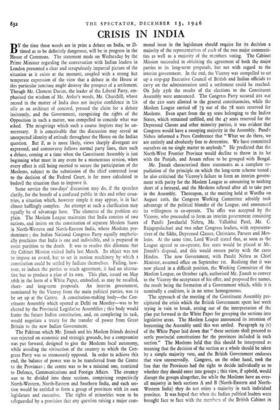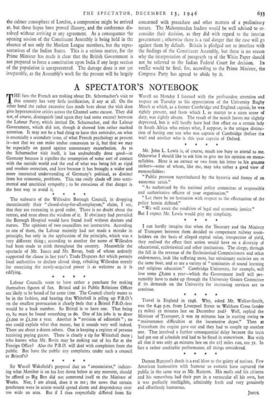CRISIS IN INDIA B Y the time these words are in
print a debate on India, so ill- timed as to be definitely dangerous, will be in progress in the House of Commons. The statement made on Wednesday by the Prime Minister regarding the conversation with Indian leaders in London presented a clear and scrupulously impartial picture of the situation as it exists at the moment, coupled with a strong but temperate expression of the view that a debate in the House at this particular juncture might destroy the prospect of a settlement. Though Mr. Clement Davies, the leader of the Liberal Party, em- phasised the wisdom of Mr. Attlee's words, Mr. Churchill, whose record in the matter of India does not inspire confidence in his role as an architect of concord, pressed the claim for a debate insistently, and the Government, recognising the rights of the Opposition in such a matter, was compelled to concede what was asked. The misgivings which such a course inspires may be un- necessary. It is conceivable that the discussion may reveal an unexpected identity of attitude throughout the House on the Indian question. But if, as is more likely, views sharply divergent are expressed, and controversy follows normal party lines, then such a debate, coming at a time when the Constituent Assembly is just beginning what must in any event be a momentous session, when every effort is still being exerted to secure the participation of the Moslems, subject to the submission of the chief contested issue to the decision of the Federal Court, is far more calculated to bedevil the situation than to improve it.
Some service the two-days' discussion may do, if the speeches clarify, for the benefit of a confused public in this and other coun- tries, a situation which, however simple it may appear, is in fact almost bafflingly complex. An attempt at such a clarification may equally be of advantage here. The elements of the problem are plain. The Moslem League maintains that India consists of two nations, and insists on the constitution of separate Moslem States in North-Western and North-Eastern India, where Moslems pre- dominate ; the Indian National Congress Party equally emphatic- ally proclaims that India is one and indivisible, and is prepared to resist partition to the death. It was to resolve this dilemma that the Cabinet Mission visited India last March. Its object was not to impose an award, but to set in motion machinery by which a constitution could be settled by Indians themselves. Failing, how- ever, to induce the parties to reach agreement, it had no alterna- tive but to produce a plan of its own. This plan, issued on May 16th in the form of a White Paper, embodied, as may be recalled, short- and long-term proposals. An interim government, nominated by the Viceroy from the main political parties, was to be set up at the Centre. A constitution-making body—the Con- stituent Assembly which opened at Delhi on Monday—was to be elected by the Provincial Legislative Assemblies ; this body would frame the future Indian constitution, and, on completing its task, would negotiate a treaty for the transfer of power from Great Britain to the new Indian Government.
The Pakistan which Mr. Jinnah and his Moslem friends desired was rejected on economic and strategic grounds, but a compromise was put forward, designed to give the Moslems local autonomy, while avoiding the vivisection of the country to which the Con- gress Party was so strenuously opposed. In order to achieve this end, the balance of power was to be transferred from the Centre to the Provinces ; the centre was to be a minimal one, restricted to Defence, Communications and Foreign Affairs. The country was to be divided into three sections, comprising respectively North-Western, North-Eastern and Southern India, and each sec- tion would be entitled to form a group of provinces with its own legislature and executive. The rights of minorities were to be safeguarded by a provision that any question raising a major com- munal issue in the legislature should require for its decision a majority of the representatives of each of the two major communi- ties as well as a majority of the members voting. The Cabinet Mission succeeded in obtaining the agreement of both the major parties to its long-term proposals, but not with regard to the interim government. In the end, the Viceroy was compelled to set up a stop-gap Executive Council of British and Indian officials to carry on the administration until a settlement could be reached. On July 25th the results of the elections to the Constituent Assembly were announced. The Congress Party secured 201 out of the 210 seats allotted to the general constituencies, while the Moslem League carried off 73 out of the 78 seats reserved for Moslems. Even apart from the 93 seats belonging to the Indian States, which remained unfilled, and the 47 seats reserved for the Depressed Classes and other minority parties, it was evident that Congress would have a sweeping majority in the Assembly. Pandit Nehru informed a Press Conference that " What we do there, we are entirely and absolutely free to determine. We have committed ourselves on no single matter to anybody." He predicted that the North-West Frontier Province would decline to throw in its lot with the Punjab, and Assam refuse to be grouped with Bengal.
Mr. Jinnah characterised these statements as a complete re- pudiation of the principle on which the long-term scheme rested ; he also criticised the Viceroy's failure to form an interim govern- ment with parity for the Moslem League as amounting to nothing short of a betrayal, and the Moslems refused after all to take part in the Assembly. Thereupon, at the meeting held at Wardha on August loth, the Congress Working Committee adroitly took advantage of the political blunder of the League, and announced its willingness to co-operate. The offer was accepted by the Viceroy, who proceeded to form an interim government consisting of Pandit Jawaharlal Nehru, Mr. Vallabhai Patel, Mr. C. Rajagopalachari and two other Congress leaders, with representa- tives of the Sikhs, Depressed Classes, Christians, Parsees and Mos- lems. At the same time, Lord Wavell stated that, as soon as the League agreed to co-operate, five seats would be placed at Mr. Jinnah's disposal, and this would ensure parity with the caste Hindus. The new Government, with Pandit Nehru as Chief Minister, assumed office on September 1st. Realising that it was now placed in a difficult position, the Working Committee of the Moslem League, on October 14th, authorised Mr. Jinnah to convey to the Viceroy the acceptance of his offer, and proposed five names, the result being the formation of a Government which, while it is nominally a coalition, is in no sense homogeneous.
The approach of the meeting of the Constituent Assembly pre- cipitated the crisis which the British Government spent last week trying in vain to break, arising out of the interpretation of the plan put forward in the White Paper for grouping the sections into legislative areas. The Moslem League announced its intention of boycotting the Assembly until this was settled. Paragraph 19 (v) of the White Paper laid down that " these sections shall proceed to settle provincial constitutions for the provinces included in each section." The Moslems held that this should be interpreted as meaning that the decision of the section as a whole should be taken by a simple majority vote, and the British Government endorses that view unreservedly. Congress, on the other hand, took the line that the Provinces had the right to decide individually as to whether they should enter into groups ; this view, if upheld, would disrupt the groups altogether, for while the Moslems have an over- all majority in both sections A and B (North-Eastern and North- Western India) they do not enjoy a majority in each individual province. It was hoped that when the Indian political leaders were brought face to face with the membe:-s of the British Cabinet in the calmer atmosphere of London, a compromise might be arrived at, but these hopes have proved illusory, and the conference dis- solved without arriving at any agreement. As a consequence the opening session of the Constituent Assembly is being held in the absence of not only the Moslem League members, but the repre- sentatives of the Indian States. This is a serious matter, for the Prime Minister has made it clear that the British Government is not prepared to force a constitution upon India if any large section of the population is unrepresented. The damage done is not yet irreparable, as the Assembly's work for the present will be largely concerned with procedure and other matters of a preliminary nature. The Mahommedan leaders would be well advised to re- consider their decision, as they did with regard to the interim government ; otherwise there is a real danger that the case will go against them by default. Britain is pledged not to interfere with the findings of the Constituent Assembly, but there is no reason why the interpretation of paragraph 19 of the White Paper should not be referred to the Indian Federal Court for decision. Its vercIict would be final, for, according to the Prime Minister, the Congress Party has agreed to abide by it.



































 Previous page
Previous page